February 2023
Te Ao Māori perspectives of what works to support wellbeing in the first thousand days examines the evidence of how to support tamariki wellbeing in the first 1000 days from a Te Ao Māori perspective.
This research examines the strength of the existing evidence, and identifies critical evidence gaps in relation to the wellbeing of māmā hapū, pēpi, tamariki and whānau across the critical and sensitive first 1000 days of the life-course.
Te Atatū- Insights Brief: First-1000-days-insights-paper-February-2023-v3.pdf [PDF, 261 KB] [PDF, 261 KB]
November 2022
Wellbeing during the first year of COVID-19 summarises several pieces of analysis examining wellbeing during the first year of COVID-19. It explores how the reported wellbeing of a population – and key groups within this population – changed over time. The report uses data from four quarterly Stats NZ surveys of New Zealand population from May 2020 to April 2021.
This report supports the release of The Treasury's first wellbeing report Te Tai Waiora: Wellbeing in Aotearoa New Zealand.(external link)
SWA-Wellbeing-during-the-first-year-of-COVID-19-v2.pdf [PDF, 1.3 MB]
Te-Atatu-Wellbeing-during-the-first-year-of-COVID-19.pdf [PDF, 342 KB]
SWA-Info-sheet-Life-satisfaction-during-the-first-year-of-COVID-19-v2.pdf [PDF, 223 KB]
November 2022
Te Atatū - Insights Brief: Children and debt to government draws evidence from examination of debt to government to examine the impact of debt on families with children. This shows that 62% of debtors are parents or share an address with a child. Persistent debt can lead to lower household financial resources and stress for parents and caregivers.
This report is part of the Social Wellbeing Agency’s reports into debt to government. For more information see The persistence of debt of government, Private and public debt and the earlier report on debt to government.
Children-and-debt-Insights-report.pdf [PDF, 303 KB]
November 2022
The persistence of debt of government examines the existing range to debt types people owe to government, the types of debt and the length of time the people have had debt to government.
This report is part of the Social Wellbeing Agency’s reports into debt to government. For further information see Public and private debt, Te Atatū- Insights Brief on children and debt to government and the earlier reports on debt to government.
The-persistence-of-debt-to-government-research-report.pdf [PDF, 433 KB]
November 2022
Public and private debt provides insights into the nature of public and private debt in Aotearoa New Zealand. Small case studies and anecdotes have previously highlighted patterns between public debt (debt owed to government) and private debt (debt owed to non-government lenders). We provide the first national picture of this relationship.
This report is part of the Social Wellbeing Agency’s reports into debt to government. For further information see the Te Atatū- Insights Brief: Children and debt to government, The persistence of debt of government and the earlier report on debt to government.
Research-report-public-and-private-debt-v3.pdf [PDF, 589 KB]
Debt-research-overview-A3-v3.pdf [PDF, 790 KB]
August 2022
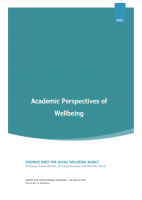 The Social Wellbeing Agency has published a summary of existing evidence on the relationship between aspects of parental, family, and whānau wellbeing and child wellbeing in early childhood, with a focus on the first 1000 days of a child's life. This research can be used to support decisions about where Government resources are best targeted, as part of the Department of Prime Minister and Cabinet's Child and Youth Wellbeing Strategy. It forms part of the Social Wellbeing Agency's three year strategy by shining a light on policy issues that affect the wellbeing of New Zealanders.
The Social Wellbeing Agency has published a summary of existing evidence on the relationship between aspects of parental, family, and whānau wellbeing and child wellbeing in early childhood, with a focus on the first 1000 days of a child's life. This research can be used to support decisions about where Government resources are best targeted, as part of the Department of Prime Minister and Cabinet's Child and Youth Wellbeing Strategy. It forms part of the Social Wellbeing Agency's three year strategy by shining a light on policy issues that affect the wellbeing of New Zealanders.
Alongside the report, the Agency has created an A3 which summarises the evidence on critical factors for child wellbeing in the first 1000 days.
Report: Academic Perspectives of Wellbeing [PDF, 1.1 MB]
A3: Critical Factors for Child Wellbeing in the first 1000 Days [PDF, 249 KB]
June 2022
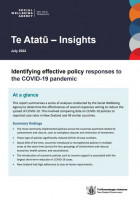
Our report, Identifying effective policy responses to the COVID-19 pandemic, summarises a number of COVID-19 policies alongside reported case rates in New Zealand and 49 similar countries.
Summary findings
Links/PDF
Identifying effective policy responses to the COVID-19 pandemic [PDF, 461 KB]
May 2022
In 2018-19, the Social Wellbeing Agency worked with The Southern Initiative to explore the benefits of combining data, science, and lived experience – specifically looking at contributing to child, youth and family wellbeing in South Auckland. With this work, we wanted to better understand the conditions of prolonged cumulative stress South Auckland whānau were experiencing around the birth of a child, and identify what might help keep whanau strong and resilient. We published a case study summarising those findings here.
In 2021, with The Southern Initiative, we carried out further analysis looking at a cohort of 53,000 new fathers. We investigated how income and occupation affected people's ability to take time off – as indicated by dips in income around the time of birth. We also estimated how many dads were eligible for parental leave when their baby is born, measured by their length of attachment to their main employer.
The key findings are:
May 2022
The Social Wellbeing Agency has completed updated analysis of COVID-19 vaccination uptake for disabled people, working with the Ministry of Health and in consultation with the Office for Disability Issues on various pieces of data analysis since November 2021.
The analysis shows disabled people have high rates of at least one dose of the vaccine, higher than those who are non-disabled. Māori and Pacific disabled communities are leading the charge by having significantly higher vaccination rates than Māori and Pacific non-disabled people.
This analysis builds on work published earlier this year, and shows a continued increase in the rate of COVID-19 vaccination in the disabled community.
The Vaccine uptake analysis contains detailed findings and trends as of 1 March 2022.
The Information Sheet contains a summary of findings as of 29 March 2022. The trends identified are the same as in the Analysis, but we have updated the data to reflect latest information.
A precursor to this work, analysing the uptake of childhood vaccinations, is available here.(external link)
Links/PDF
Vaccine uptake analysis of disabled population aged 12 and over as of 1 March 2022 [DOCX, 1.3 MB] (Word doc)
Updated analysis: COVID-19 vaccine uptake by disabled people [PDF, 219 KB] (Information sheet)
May 2022
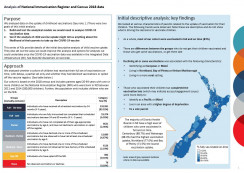
In late 2021, the Social Wellbeing Agency undertook research to identify potential barriers to uptake of the COVID-19 vaccination(external link). To do so, we needed to build and test analytical models. We analysed data on the uptake of childhood vaccinations as a proof of concept. This analysis can be used to identify those who may experience barriers to having their children vaccinated on time, so agencies can look to address those and ensure tamariki are protected from preventable illnesses.
Analysis on the uptake of childhood vaccinations [PDF, 414 KB]
May 2022
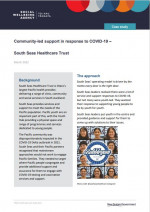
South Seas case study [PDF, 469 KB]
April 2022
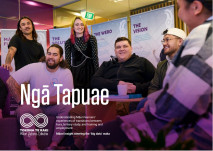
Our work involved:
Tokona Te Raki has now published its report(external link) about the project. The views and recommendations in the report are those of Tokona Te Raki.
February 2022
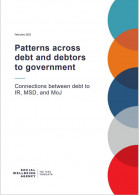
The working paper uses data from 2018 and focused on debt to the Ministry of Social Development and Inland Revenue.
The research report builds on this previous analysis and uses debt records through to September 2020. It identifies connections between debt to Inland Revenue, the Ministry of Social Development, and the Ministry of Justice, and is aimed at filling gaps in understanding about the nature and characteristics of debt and debtors.
Links/PDF
Patterns across debt and debtors to government [PDF, 772 KB](external link)
Understanding debt and debtors to government [PDF, 722 KB]
December 2021 (some text updated April 2022, data remains the same)
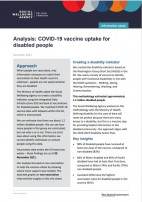
Links/PDF
Vaccine-analysis-info-sheet-final-version-15-Dec.pdf [PDF, 209 KB]
COVID-19 vaccine uptake for disabled people - Vaccine analysis (Word) [DOCX, 111 KB]
July 2021
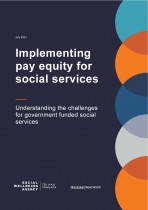 Description
Description
Ministers commissioned the Social Wellbeing Agency to identify the challenges of funding and implementing pay equity across the ‘funded sector’ and to identify potential sustainable solutions. The funded sector captures organisations sitting outside of the State sector which receive government funding to deliver social services.
This report summarises our findings and was informed by research we commissioned from FrankAdvice.
Link/PDF
Implementing pay equity for social services [PDF, 592 KB]
April 2021

This project investigates how the local experience of a service may differ from nationally reported figures. We focused on the B4 School Check – a free health and development check available to four-year olds – using a geographic lens and describing the children and their families missing out on the B4SC at the local area level. This report provides an overview of the project and highlights the key high-level findings.
April 2020

This short report presents key insights about those at risk of social isolation and loneliness from a literature review and descriptive analysis of the 2018 New Zealand General Social Survey. Specifically, insights are drawn about the effects this risk has on wellbeing and the likely impact of the COVID-19 Lockdown. This report is for government and non-government decision makers, researchers and evaluators, and others with an interest in the topic. The aim of is to add to the growing evidence base on the impacts of COVID-19.
The key insights are:
Note: This is a working paper.
April 2020

This scoping paper was a preliminary desk-based exercise completed in 2019. It was prepared as the basis for consultation and possible development of a short wellbeing survey for small organisations. We are publishing it in 2020 because some found it useful to help data collection relating to Covid-19.
Note: This is a working paper.
March 2020

The purpose of the Place-Based Initiatives (PBI) model is to improve outcomes for at-risk children and their whānau by shifting collective decision-making and discretion to the local level. In 2016, Cabinet selected three PBI sites: Manaaki Tairāwhiti, South Auckland Social Wellbeing Board, and Kāinga Ora in Te Tai Tokerau. Kāinga Ora was disestablished in 2019. This report qualitatively evaluates the implementation and emerging outcomes of the PBIs.
February 2020

The Social Wellbeing Agency partnered with The Southern Initiative to explore the benefits of combining data, science, and lived experience – specifically looking at contributing to child, youth and family wellbeing in South Auckland. With this work, we wanted to better understand the conditions of prolonged cumulative stress South Auckland whānau were experiencing around the birth of a child, and identify what might help keep whanau strong and resilient.
October 2019

We explore the impact of social housing on people’s wellbeing and find that generally people’s housing conditions and overall sense of life satisfaction improve as they move into social housing. This analysis builds upon our earlier exploratory work [PDF, 1.3 MB] by adding an extra year of survey data and by improving the rate at which administrative records are successfully linked to survey responses. Wellbeing outcomes for people before and after placement in social housing are then assessed.
August 2019

This paper examines how wellbeing outcomes change when people transition from benefit into paid employment. Using SIA’s methodology to connect wellbeing measures with social service usage, this study combines data from the New Zealand General Social Surveys with government administrative records.
Note: This is a working paper.August 2019

To provide information on the living standards of individuals receiving income-tested main benefits compared with the working-age population not receiving an income-tested benefit, this paper uses data from the New Zealand General Social Surveys linked to government administrative records. A range of measures of hardship and wellbeing for individuals receiving a main benefit are considered.
Note: This is a working paperNovember 2018

Findings of the ‘Your voice, your data, your say’ engagement on social wellbeing and the protection and use of data.
November 2018

The steps we took to analyse and sum up what we heard from 'Your voice, your data, your say' engagement on investing for social wellbeing and the protection and use of data.
November 2018

We’re developing a new approach to analyse the impact of social services on the wellbeing of New Zealanders. This can help funders, providers and others understand whether these services are making a genuine and lasting difference to people’s lives, and inform better decisions about where to focus effort to improve people’s wellbeing.
November 2018

Our new working paper 'Measuring the wellbeing impacts of public policy: social housing' examines the impact of placement in social housing on peoples’ wellbeing. The paper tests a novel method of combining administrative and survey data to connect wellbeing measures with social service usage and includes preliminary results.
October 2018

Included in this update is a summary of what we heard from service users and dedicated Māori and Pacific hui participants between 4th August and 7th September.
August 2018

Included in this update is a summary of what we heard from non-government organisations (NGOs)/service providers, regional government agency staff and a number of government agencies at a national level between 31st May and 3rd August.
June 2017

We've completed our first social investment test case: social housing. We crunched the numbers on social housing to help understand what benefits there are for those living in a social house.